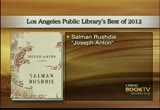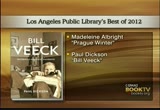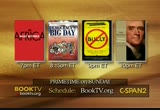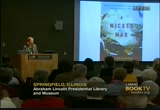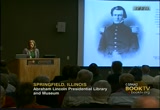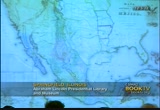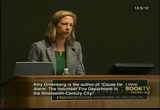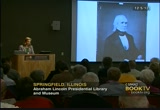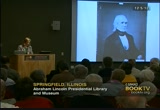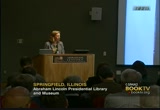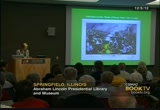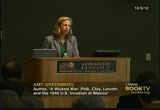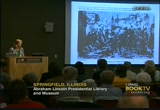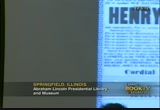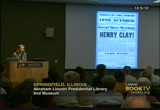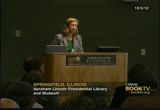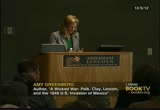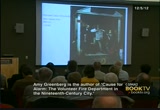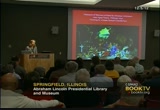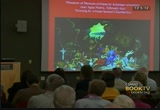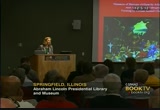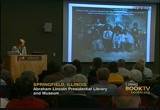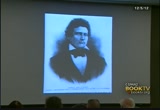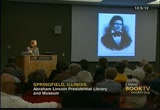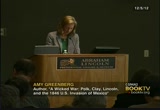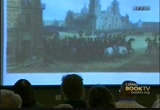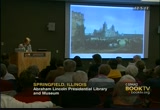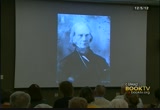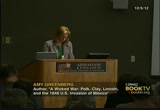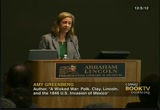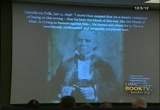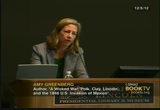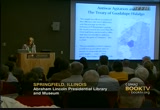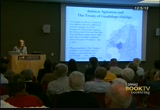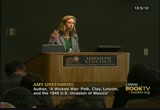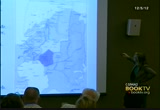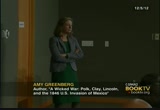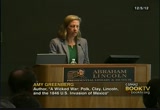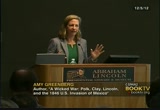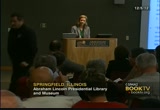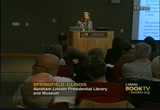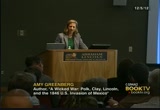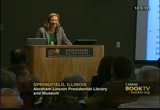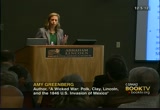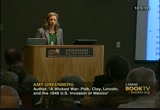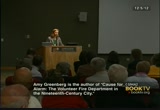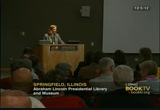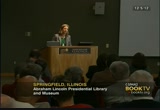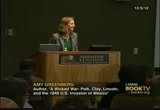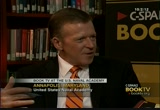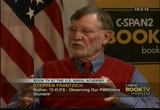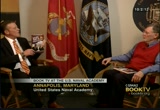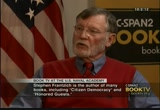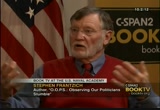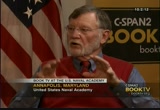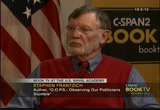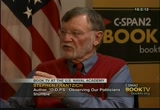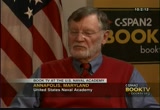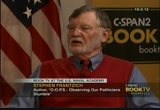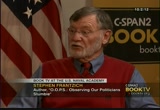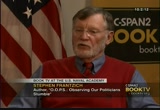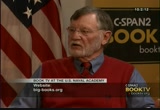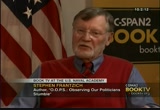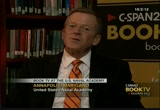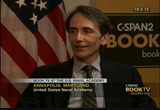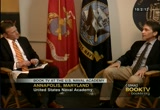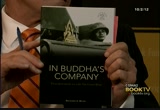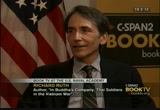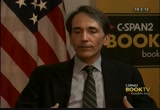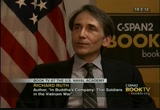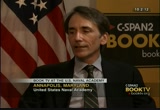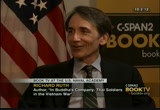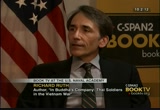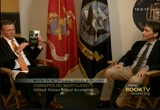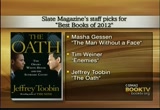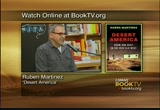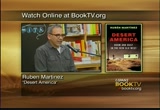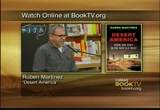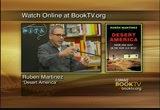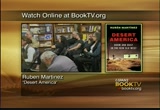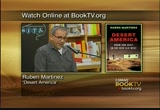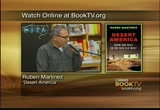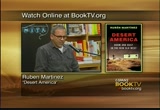tv Book TV CSPAN December 16, 2012 9:00am-10:30am EST
9:02 am
>> amy greenberg recounts the mexican-american war in 1846. the author examines president polk's decision to go toward door that congressman abraham lincoln and henry clay played in the debate. this is about an hour. [applause] the mac thinks, to nice. i want to thank everybody who's so nice to meet here at the abraham presidential center. i've got me to her and seeing that they need to worry stewart. i encourage you to see when there's not some event like there is right now. the relationship between war as
9:03 am
in the lincoln is really intriguing. i want to talk about today is my most recent book, "a wicked war: polk, clay, lincoln, and the 1846 u.s. invasion of mexico." the title dream to is taken from a quote from ulysses s. grant. from the thinnest i've come across back in everything he did then in his career and this number as he writes frankly about experiences he's had, the good in the bad and it makes for good reading. but one thing that grant spent some time together talking about in his life was his role in the u.s.-mexico war of 1846. grant said at the time, i do not think there is a more wicked words and outraged by the united states and mexico. so at the time when as a youngster, only he had not wrote urging us to resign and grant during the time that the u.s.-mexico war was a young lieutenant.
9:04 am
i found this a really moving quotes so he took it from a typo. the fact is grant was not allowed in thinking the u.s. invasion of mexico was somehow wicked. one thing i talk about in this book and tonight is the evolution of the american public during the course of u.s.-mexico war, which is not about word by any means from being really the csh to largely turning against the war. i see the u.s.-mexico war as a moment of america's first antiwar movement coming into being. so there's antiwar sentiment during the revolution and certainly during the war of 1812. that sentiment was limited. but gc happened in 1847 is a consensus across the board. people across the country can soldiers in the field, officers, politicians, all decided that a war was the successful invasion
9:05 am
of their country was wrong in protesting the war. so this is an interesting moment in american history and it takes place and they were people don't know much about. the u.s.-mexico were, people don't write about it a lot. it doesn't have a good place in the historical imagination of americans. it's often confused the texas revolution that have been eight years before or ignored altogether. when historians talk about the u.s.-mexico war, they tend to think about the war in relationship to the civil war. they narrowed the war i started the first stop on the road to secession, arguing the land that came from mexico at the close of the war was what really caused sectionalism to heat up and in fact all of that is true. look at the war at the moment the civil war became inevitable if you want to look at it that way or you can look on it at its
9:06 am
own terms which is what they do in this book. what i was interested in doing when i wrote this book was to show the impact of the war and individuals in a family. the u.s.-mexico war had the highest mortality rate of any american war. 15% of soldiers in certain mexico for the united states type your 70,000 troops certain mexico and if they were a heavy big impact on people at home. i wanted to write a narrative that explored how people in the 90s states and also in mexico, how the war impacted than in their families and people i talk about in this war are abraham lincoln, who makes his first major political speech, a speech i found quite widely documented and discussed in newspapers. his first major speech in congress is about the u.s.-mexico war. so lincoln's first political stance on the national age is against the u.s.-mexico war.
9:07 am
that's one person i talk about. another person i talk about is john jay hardin, some of you may be familiar with. he was part of an important family jacksonville and for a period of time as the leading whig politician in the state of illinois. not abraham lincoln. hence cast in the u.s.-mexico war some argue makes his path forward and wrote to the possible because he was under the shadow of john harden before that happened. her insanely assassinating and it deeply affected by the u.s. civil war. and they tell you a little bit about the war because they assumed like most people you don't know a whole lot about it. the north american invasion as it is known in mexico began when president james k. polk sent troops into a disputed area between the new bases and rio grande river with the intention of starting a war. polk wanted more.
9:08 am
he was sent on declaring war of the mexican army didn't raise to the debate. the day before he found out that mexicans had crossed the rio grande and killed 14 soldiers in this disputed area, polk actually went to his cabinet and said i think we should declare war against mexico. his cabinet said we can't declare war against mexico because the mexicans have it done anything. we sent 4000 american troops down into them at mexico thinks his players in the waiting for something to happen and it hasn't happened so we can't go where i mexico. he finds out the next day an incident had happened two years ago -- two weeks before. when paul caught this incident, he went to congress in may of that income 1846 and 30 mexico set the boundary benighted days has invaded our territory and should american blood on american soil. this was a lie and everybody knew what was a lie.
9:09 am
the way party, the opposition party, abraham lincoln party, everybody in congress knew in fact the land of the soldiers had been sent, where the crew is currently occupying a big considered mexican rather than texan land and a lot of congressmen, both legs and democrat met privately to each other after polk makes the statement. welcome to the idea of this is american soil that blood has been shed on this pretty dubious. the fact of the matter is everybody lines up in favor of the declaration of war. you can't call it a declaration of war because polk is asking congress to declare war. he said war is going on, let's send support to the troops. so the brakes are afraid of looking unpatriotic, of suffering under the label of not being each. so while the 14 members of congress voted in favor of declaring war against mexico and that's how the war started. the mexican were short. it's 20 minutes total and only
9:10 am
16 months of those are actual fighting. as you are today the war is not short enough for the american people. it was marked by a number of stunning military success is that the united states such as the battle of buena vista were 5000 u.s. soldiers defeated an army under general and tonio lopez toussaint and the. the numbers that the ratio and the battle of buena vista is obviously quite astounding. the fact of the matter is that almost every battle of the u.s.-mexico war, mexican troops greatly outnumbered u.s. troops yet the u.s. won every single military engagement in this war with the exception of the battle of pain scout in california, which americans think of as skirmish rather than a battle. so that doesn't count. other than not, americans win every single battle. there were three theaters of the war. in the first stage, zachary taylor secured mexico's key that
9:11 am
juries including the one of buena vista in the first months of 1847. the second theater of war, general stephen carney travels west from fort leavenworth in kansas to new mexico, conquering new mexico to california. that happens about the same time. neither of these tremendously to restrain what polk wants, which is peace and the securing of california and texas into the american union. mexico refuses to surrender despite the fact trees of both taylor and carney. the poked pope is jesus and winfield scott to invade central mexico. he bombards veracruz and travels through central mexico securing the capital of the fall of 1847. now in the eyes of americans, it was sort of a foregone conclusion that there sideway because most u.s. citizens harbored a host of racist police of mexican men.
9:12 am
foremost among them being mexican men were too lazy and cowardly to fight. in point of fact, mexican troops but very hard as you can see in this print, mexico produces few images of the were so it's great when you find them so you can get a sense of how their envisioning this happening. mexico lost all of these battles and ultimately lost the military side of the war because they had vastly inferior weapons. their leadership was terrible. mexico's government was in turmoil. they were broke. there were various battles for no money was even making it to the army to support his titles. because hostile, native american tribes in the north of mexico had so ravaged northern mexico that there is little will to resist among the mexican residents and the northern part of mexico. now, on the mexican side, most
9:13 am
of the army was made up of conscripts, but on the u.s. had no soldiers were actually volunteers. that's the really interesting thing about this war. at the start of the war, support was so overwhelming, particularly in the west end, many more men volunteered to fight that could actually be taken volunteer regiments. the overwhelming and the csm for the war. in fact come in the midwest provides the most troops fighting in mexico. of other people think it's the south. it isn't. missouri and illinois provide the most troops to fight in mexico. nonetheless, support for the war was not universal at the beginning. here we have a campaign poster for henry clay was the weak nominee in 1844 and his opponent in 1844 was james k. polk, who ran on the platform of the mexican typeface and expansion generally.
9:14 am
clay opposes annexing texas in 1844 because he believes that it's going to result in war with mexico. i loved this poster when i discovered it from a campaign appearance in indiana. if you look at the list but you should support patrick leahy are from 1844, the first couple are really typical weak economic decisions. so the weeks are generally the party of economic development and the 1840s. when you get to the 43 same company can see, are you for or against the annexation of texas? are you for or against texas death? are you for or against an unjust and disgraceful war with mexico? and may favor one, are you for or against national perfidy, dishonor and disgrace? this is in 1844. this is what they'll say if you don't vote for henry clay were going to be in a war with mexico. people can see the writing on
9:15 am
the wall. in new england at the start of the work on antislavery sentiment was widespread and also antiwar sentiment. so pretty early on and the war, the massachusetts house of representatives states this war is immoral and it will oppose it and a lot of new england intellectuals provide really stringent critiques of the war. ralph waldo emerson, henry david thoreau speak out against the war in pretty strong terms. now, i think if opposition to the war had remained limited to doing good, it would be interesting, but wouldn't really be that different from what happened in the war of 1812. what you see happiness over the course of the war, delinquent stamps being the only place it is the national antiwar movement. there are four main grounds on which americans oppose the war.
9:16 am
the first one in this poster is on the grounds of morality that this was an unjust war that would bring national dishonor of the united states. congressman joshua giddings of ohio repeatedly warned the house of representatives that in order to be patriotic, people had to quote, descend from this aggressive unholy and unjust war and he said in the murder of mexicans upon their own soil for rapid and that the country can take no part either now or after. and giddings was rather strong in his opinion, but that was a kind of critique that you see certainly by march of 1847 with united states bombarded the town of veracruz, leading to the deaths of a lot of civilians. there was an anti-mexican war courtis based on reality. the second crowns on which people critique the crowns upon
9:17 am
slavery. he was abolitionists, but it was not just abolitionist for people in new england who saw slavery been important to this war. a lot of people felt if the united states did in fact the next large portions of mexico could make slavery spread in the slave power stronger. again, it wasn't just people in new england who held this view. consider for a moment this popular print of the war. when you first look at it, it's kind of a neat image of the power of newspapers in the 1840s. this is for news from mexico by richard catton who was a well-known and good artists at the time. and that second image of people being enthusiastic. they've gotten war and their newspapers through the u.s.-mexico war was the first war for journalists traveled and worked in adequate troops. recently journalists traveled
9:18 am
and brought back stories. this is the first war where people were getting immediate news about what's happening from a first-hand account of journalists traveling with troops. look at the image a little more closely. you should tell you first saw the woodville was from baltimore, not new england. notice how he pleases laserwriter printing center of the image. i think what it's asking to think about the implications of slavery. if you look to the edge of the image, you can see at night who was tossing a match into a barrel, suggesting what is mexico going to do except set off a firestorm? again, this is an image from baltimore about the war. another major critique of the war have to do with what people saw as the impact of service in mexico on the american character.
9:19 am
do people actually argued the mexican war was making the american character wears, but in fact he was degrading american soldiers and turning them into the people we really didn't want them to be. this critique became especially strong after reports of very bad behavior by american troops needed in the u.s. newspapers and a see that happening in the middle of 1847. particularly in northern mexico, the volunteers i told you about behaved extremely badly. they murdered civilians in the streets. they mexican women. there were reports of entire villages being burned down. general zachary taylor felt like he couldn't control the volunteers. the volunteers were under control of their own commanders, coming from their own towns and none of them seem to abide by the kind of discipline that taylor expect it and basically got the regulars in the army. here is one image of a massacre of 25 mexican civilians by
9:20 am
arkansas volunteers known as the racket factors in northern mexico in figure 1847. this was painted by a soldier from illinois who claim to see the massacre have been. it was reported all over the united states. the racket factors are taking revenge on the people of mexico for the murder of one of their phones. so they started indiscriminately gathered mexicans and to them into a cave and kill them. this is a widely reported incident by no means was it exceptional. a couple weeks after this happened there is another massacres similar perpetrated by the dems. when the american people read about this behavior come and help turn them against the war. the st. louis republican with a newspaper that when you heard about the massacre, as initially claimed he couldn't be true, so they deny it. once the newspaper got
9:21 am
verification, and actually wrote to all of its readers. it said let us no longer complain about mexican barbarity, priest ridden as she is coming apart of inhuman cruelty perpetrated by her most desperate robbers can excel the work of yesterday committed by her soldiery running in america. finally, the fourth reason and perhaps the most important reason for the antiwar movement spreads and becomes a major force in america is basically racism. a lot of americans felt like association with mexicans would just corrupt american manhood. it also has the potential of degrading the united states altogether by watering down what americans believe to be their anglo-saxon blood through the incorporation of mexicans. south carolina's greatest oratory or, john c. calhoun was a firm believer in the court
9:22 am
didn't say native american society is a very active opponent of the war with mexico because he can't mexicans did not belong in the united states. he said quote, i protest against the incorporation of such a people. ours is the government of the white man. calhoun was hardly alone. a lot of americans really felt like mexican they may be desirable. having to take mexican people with their posted problem to the united states. now it wasn't just intellectual ministers and middle-class northern reformers making these critiques. one of the contributions i think my book makes a showing the world the soldiers are not serious played in the revolution of this antiwar movement so this brings me colonel john harden, an illinois children and introduce you to and with kind to know very well after spending many hours of this family papers in chicago. how hard and from jacksonville was a farmer with congressman,
9:23 am
part of the wealthy and can stooges family, related to henry clay through marriage and blood and tightly woven kentucky aristocracy. harden was the first man in illinois to volunteer to fight the u.s.-mexico war. in fact, he was volunteering to fight for the war before it started. he was writing letters to stephen douglas, even though he was a democrat, he was a good friend of his. he had military experience. he fought in the black hawk war and he actually was in charge of taking the morbid side of the state of illinois. so harden was a big military guy, a political guide and he really wanted to fight mexico. he wrote letters to newspapers saying this is their greatest possible opportunity to gain california for the united states in a force declared i will be at the front of that movement and in fact he was. now, harden is very excited about the possibility of taking
9:24 am
mexican territory. a big proponent of manifest destiny. the disease change quickly and dramatically. what harden for states to mexico, he writes in rapturous terms about potential silver mines is heard about and he says the silver mines here are supposed to be the richest in mexico and were only abandoned by the ignorance of the mexicans. he said would only require a little skill to make these mines very valuable. is excited and you can see in american hands. the longer he spends in mexico, the less he likes it. in december 1840 come a few months after he writes in mexico, yugoslav partner, there's not an acre and i'm wondering if paid taxes on the people of mexico were far worse. i've never seen a drunken mexican income hit me. that's the only good thing i can say. permissible race of the few intelligent man. three quarters of the people are
9:25 am
peons have this much slaves of the south. they would make a miserable addition to any portion of the population of the united states. to another friend he wrote a week later that the only difference between the peons of mexico and slaves of the south is their color. he sent us for making these peons voters and citizens of the united states, it should not be thought of until we give out news about. so these are hardened thoughts on what's happening in mexico. the transformation occurred after only three months in mexico. he told the third friend, he said, although i was for annexing of the mexico before he came here, yet i now doubt whether it's worth it. so much for mexico's people are not better than the country. harden's evolution from this expansion is introducing a phobic cynic of the war was a rapid one, but it wasn't uncommon. hardin's views are shared by many in the army.
9:26 am
like i said, midwesterner so do most of the csm for the war with mexico's, but many decided it wasn't such a great idea after all. their exposure of the land led them to question the future of manifest destiny and frankly commanders were no more enthusiastic. both general taylor and scott pushed for a quick end to the war and expressed reservations about the value of mexican territory to the united states. now the national antiwar movement became a particularly heated after winfield scott's troops captured mexico city in september for team, 1847. here's an image of scott entered mexico city. if you look at the lower left-hand image you can see at eon picking iraq and preparing to throw out the american troops. an image that expresses extreme hostility of many people in mexico city to have in their city occupied by american troops. initially as you can imagine americans are extremely louisiana state that their army
9:27 am
had conquered the capital of another country. but when mexicans refused to come to terms in any peace treaty, what began with a period of cometh very bleak occupation that ended up being terrible for the army and terrible for the pro-war movement generally. winfield scott's troops were suggested to daily guerrilla warfare by mexican part enforces and there was really no end to the war because mexico still refused to give up. at the same time come expansionists in the united states once the unit is captured mexico city began to argue the u.s. should annex all of mexico. if you've are to conquer the capital city, why not take it out. it's at this point the people around the country begin to question whether this war should go on any further. the turning point in the creation of the national war movement occurs two months after
9:28 am
scott occupies mexico city, windbreak henry clay gave a speech in mexicans, can turkey against the war. clay had been out of the spotlight and his disastrous terrible defeat by james k. polk and the election of 18 for what she never expected and frankly should not believe for the fact he opposed the annexation of texas. unfortunately, henry clay not only had to suffer through that defeat, but his namesake, henry clay junior like john jay harden, although he was a whig a one to two trips to mexico. henry clay junior becomes the leader of kentucky troops come it takes them to mexico and is coded the battle we do this to justify john jay harden is. so henry clay has raised the death of his son and a war he did not believe in. after his son's death, he
9:29 am
becomes very religious, gets baptized in the episcopal church decides to make a speech opposing the war he hopes will bring the war to a close. clay's speech, which is hugely important because reporters traveled over 100 rows to hear it in the newly invented telegraph and within a couple days at the speech been uttered by him, it was reported around the country. clay speech touched all of the grounds for opposing the war that i mentioned. he talks about how in world wars and the u.s. has lost it sterling reputation abroad. he talks about american soldiers being disqualified by a wild spirit of adventure from returning to civil society. he says slavery is a great evil and may cause a split of slavery. he also makes it clear that there are racial reasons to oppose the war. clay asks his listeners come as any considerate man believe for possibly two populations so when
9:30 am
congress comes a different race can religion and must be blended together in one harmonious mass? after this rousing speech, clay called for mass meetings around the country to end the war and people actually took him up on it. i've located over at 30 meetings since support of clay antenna solution from indiana and new jersey and louisville to me in the geographic scope of people meeting together in public forums say yes, we need to leave mexico and the word immediately as well be on the opposition of the of the war of 18,000 constitute the national grassroots antiwar movement in american history. by the way i should tell you what clay asked to have happen was for the united states to leave mexico and not take any territory from mexico altogether. he won a piece about any territory, which of course didn't happen. that just two weeks after clay speech, 30s congress convened in washington against tuesday
9:31 am
or, abraham lincoln. abraham lincoln hurt clay speech amok and because he was visiting the town on its way from springfield to washington d.c., visiting mary family in lexington and while he was there can be cut to your henry clay's peak. this is a tremendous thing for lincoln. lincoln had idolized clay. he caught is though ideal of a politician and to have the opportunity to hear clay speak must've been a huge thing for him. when lincoln was young, he carried around a book of clay speeches in history than to himself. when he was a young man and the legislature in springfield community president of the clay club and asked him to speak in springfield and clay didn't comes, so this is lincoln's opportunity to to meet the politician he respects and admires the most to be hurt clay gives a speech against the war. so perhaps it isn't surprising that the blanket gets to washington instead of talking about terrorists or economic issues that motivated him as a
9:32 am
politician come he decides to oppose the war. the first speech lincoln gets in congress are what is known as the spot resolutions, where he gets up and close the president a liar for claiming american blood was spread on american soil. he lays out this list of reasons why it was an american soil. thinking second national speech is a cometh very dramatic attack on pope and an attack on the war , the highlight of which being lincoln saying that he more than suspects the pope is deeply conscious of being in the wrong. he feels the blood of this or that the blood of abel crying to heaven against him. he knows not where he is. he's bewildered, compounded and complex man. about this and manage of polk from late in his presidency. polk basically worked himself to death in support of this war. he worked incredibly hard yet
9:33 am
you can see how much she's aged to the picture taken at the start of his presidency. so lincoln adamantly attacks spoke. most scholars who have looked at lincoln spot resolutions have said these attacks were gored. i found by looking at newspapers this is is not the case and attack the spot resolutions of the speech you see here was widely reprinted across the united states. this is lincoln's first taste of national acclaim and attention. little did lincoln know, but the president was confounded and here was why. back in the summer of 1847, polk dispatched nicholas trace to negotiate a mexico. the one scott occupied mexico city and captured mexico city, polk began to think in fact we should take more of mexico then the treaty stipulated. polk wanted to sleep ha ha, california in the united states. he wanted the state of sonora in the united states.
9:34 am
he had expansive designs on what the united states should take from mexico for a much more he told tryst he had negotiated for. he told trista come home to what happened was refused to come home. traced, along with scott decided that vacated peace treaty with mexico is the most important thing he could do. he wanted to make a treaty that was not expecting to mexico. he wanted to save the mexican people from a continuation of the war and dismemberment of the country. he said i'm not going to come home and he made a treaty of quantum that they had although despite the fact he wrote to his wife, i will probably never work in washington again. my career was over and affect his career was over. polk was so angry that he withheld pay interest, his family became incredibly
9:35 am
poverty-stricken. it wasn't until after the civil war when ulysses grant was president petraeus got another position and was given this sort of not very demanding as they should run in post office in virginia. up until that point, he was broke and his family suffered terribly because of this. now let me just kind of rap this up and tell you what i think the antiwar protests, the context for them. the quote i have hear from polk from january of 1848. this is what he said to his cabinet. he said at this point he may be going to accept a secession of the mexico in the two californians, baja as well as all to california and passage to to want to pack paying much less from and in addition we should secure the port of two pico. if you look at this not which
9:36 am
i've turned on its site to show the importance of the gulf of mexico, you see various that demonstrate what people wanted to take. we see if i can get this going here. so this is the initial line exit offered in negotiations. if you look here, this is the polk was hoping to take in january. so what that would've brought us an additional one third of the country of mexico into the united states than what ended up happening. unfortunately on february 19, the treaty of water that they had although. pope decides he has to accept the treaty because there's no other congressional support for the war. he thinks long and hard and right going to have to accept this treaty even though i don't like it and this was that i won't because the pop abilities congress would not grant either
9:37 am
men or money to persecute the war and then at least new mexico and outside, california. just to conclude you're committed the antiwar movement achieve his goals? certainly not. henry clay wanted the united states out without taking territory. i don't know was extremely realistic decision, but this was clay's position. did the antiwar movement and the war? as a strongly antiwar education in congress and on the ground forced polk to bring the war to a close, even though he wanted her territory. i think it did limit the territorial acquisition for this war. i believe that pope bonilla to continue fighting, mexico would've been forced to give more land than ultimately did. it i definitely mobilize the public in support of bringing an american war to a close for the first time. so it's important to acknowledge the antiwar movement existed in the past, that they can work,
9:38 am
the canaveral effects and limit the loss of life. the antiwar movement that emerged that all of these things. thank you very much. [applause] [inaudible] >> absolutely. all right, sure. so this is the area of mexico originally was looking at, which is really the top half of california indirectly through. so the san francisco bay across. this is that the united states and that taking. and this is a polk wanted down
9:39 am
here. [inaudible] [inaudible] >> yes. it's been a stephen douglas' position on the war? >> douglas favored the war. he was a democrat. he does not trust poke at all. and before the start of the war he says i don't have any idea. none of us have any idea what the president is up to. but he supports the war. he doesn't give any big speeches. i [inaudible]
9:40 am
>> and historical memory while the war faded. the first reason why the war faded from memory was because the civil war followed it not many years later and the civil war at all of the early battles in the u.s.-mexico war, but also kind of a message that america could believe in, which was that we were reunifying the country and talking about not southerners here. is it yours in the war were able to craft a narrative that is extremely uplifting and has remained uplifting. so as they were germanic and exciting work. it was a much bigger war. many more people were killed and many were worried off. the other important reason why people forgot about the mexican war if i do not think it fits the narratives americans tell themselves about military involvement. if you think about the worst
9:41 am
americans like to commemorate the one character attack about in this book at some length is a linhart walworth, the 14-year-old daughter of john harden when john harden was killed. she and her father wrote letters back and forth when he was in mexico. but he was killed, she was devastated. alan harden goes on to found the daughters of the american revolution later in her life. her thinking about the american revolution is that it's a worth of teach people page treatise on. so she becomes this prolific author about the revolution and a defender of battlefields of saratoga and really important national figure and she never talks about the u.s.-mexico war, even though her father being killed and up or was the defining factor in her life. the revolution not just for alan harden, but a lot of americans if they were about principle. the civil war is about principle
9:42 am
9:43 am
>> yeah. [inaudible] >> right. >> -- there's a strike at bloomington which is not far from you or the imported mexican labor when the mexican workers got here and realized the union was on strike to refuse to work effectively under the strike. so there's a huge turnaround as far as attitude and again the people. >> authoress, but there isn't a change in attitude. a lot of people in the united states are perfectly happy to import mexican laborers as long as they can be sent back to mexico once the season labor was done. the program is incredibly unfair to mexican laborers and set a
9:44 am
model for importation of other laborers that continues to sustain in terms of disposable laborers who have limited rights that can be brought in and sent back it well. in terms of the way that the mexican people who became part of the united states retreated, it's a terrible story. one thing i found kind of profound inside looking at those is that there's a number of mexicans who support the u.s. cause. they actually think they're better off under u.s. government to be argued mexico's government because the fact is mexico does not treat the residents of the northern territories very well. it's not interested in them, does not provide them with interest and a lot of these people, particularly large landowners in california actually come on board the u.s. cause in support u.s. troops. they provide troops with horses and ammunition and those people on disneyland because the fact of the matter is although there are supposed it legal rights
9:45 am
that are given to these people, the way that property disputes play out is in local courts because they are incredibly racist against mexican people. pretty much everybody in california is mexican and at the same event could you see similar things going on new mexico. it's not a happy story in any way. in terms of the larger question you ask about, attitudes towards mexican people, i published an op-ed piece not that long ago looking at the u.s.-mexico war as the origins of what is referred to as the latino immigration problem. if you look at what happened in this last election, the republican party said afterwards we need to change the way we talk about immigrants because it's costing us those. the fact of the matter is that he knows voted overwhelmingly for democrats in this election and a number of house races, which were supposed to be tossups ended up going to democrats because latinos in the
9:46 am
area voted 70, 75% favored democrats. republicans need to think about a new rate to talk about immigration. but there's this ongoing problem people have in the areas we talk about here, which were once mexican and were taken from mexico at the end of the war come with the presence of mexican people makes anglos feel extremely uncomfortable and leads to this kind of anti-immigration rhetoric. really good point. >> at like to you to comment and be of your observations on the antiwar sentiment that prevailed after the mexican war, why there seemed to be such popularity associated with the filibuster movement. willie walker and david baja. >> that didn't go very well. >> granted, he did not succeed.
9:47 am
but why would it be so popular? did it seem as though it was a different area? the opportunity for expansion? how do explain not quite >> i wrote a book about this code manifest manhood and it's all about support for filibustering. william walker, his exploits in sonora are pathetic and very, very sad. she doesn't know what he's doing. the truth of the matter is when he goes back to san francisco and is tried on violating neutrality rules, he goes free because you can't find a jury to convict him because a lot of americans believe in manifest destiny. but what good is to becomes the president of nicaragua that he becomes a huge national figure. a lot of people in america have these expansive views of what the united states can become. it's not a mutual need to pick is for people to talk about the united states in compassing all
9:48 am
of central america, canada, perhaps south america. this is what people think is going to happen. how do you do with the situation? it's not a coincidence that william walker supports slavery. his ideas to bring african slaves into these areas geared some people talk about perhaps we shouldn't say essential americans themselves. so it's a strange and unusual situation, the filibustering exist very uneasily with the u.s.-mexico war. but by no means at the close of the u.s.-mexican war stop people from territory. i think the ease or seeming ease with which the u.s. tech half of mexico's territory broadens expansionists to say it said was that easy to get that much of mexico, we can get central america no problem. at the very back.
9:49 am
>> two questions are forming in my mind. [inaudible] first question has to do with the immigrants coming to the united states during the 1840s. did they have an opinion or observation about the war, and how did it affect their immigration to u.s. society? second question is core of montgomery research reporting affect the national attitude or is this continue to fester the ideas of manifest destiny? thank you. >> i read a lot about her reporting is very important. some people implicated her in a plot to do a peace treaty, but it's basically bad -- i don't think there's a lot of support. so i don't think cora is a huge role in this world though she
9:50 am
certainly does in experts at the 18th of these. in fact, she's a big proponent for a northern view that annexing mexico will actually help race relations of the united states is supposed to make slavery worse of a problem by providing an outlet for slaves. she actually promotes this pretty much totally crazy idea that if we take mexico or parts of mexico or central america, slaves and free blacks will close out and bite the northern part of the united states. yes. she wasn't the only person that said that. it's hard to believe anyone took this seriously and i don't know that they did. the other questions about immigrants is interesting. the 1840s and 18 to these other. at the highest rate of foreign immigration in the united states and american history. we think it's the late 19th century, which is the real immigration. in terms of numbers, the most
9:51 am
immigrant come in the united states in that. weird the 1840s and 1850s in terms of population have huge numbers of irish people fleeing the potato famine and other immigrants coming in the united states imposing a lot of problems to a lot of people in the northeast especially in terms of assimilation. a lot of those immigrants go inside and u.s.-mexico war the race they do that if they don't have economic opportunity in the united states. for the most part they are not good soldiers. an entire battalion informed by mexico by deserters from the u.s.-mexico war called the san patrizio. people think they are all irishmen because the kerry and irish flag and their leader was a guy named riley. when you look at people, there's a lot of german spare, too. they were for the most part catholic. one thing i did talk about in this story about is a very, very
9:52 am
and tend tension between catholicism and mexico in the mainstream of most americans. a lot of americans got to mexico and think they're going to convert catholics or redeem catholicism and basically get rid of a catholic threat and immigrant fan into that. i was lucky enough to have a graduate student who reads german work with me on this project and he translated german accounts by soldiers who ran into the war. they all think the war is a terrible idea. they think it's ridiculous. so overall, europeans are able to see from the beginning sort of the flaws with this idea started a war against neighboring republic in order to take the territory. there's a lot we could say about this, but i'll have to leave it at that. i've got one more question. is [inaudible] >> okay, i'm going to send you
9:53 am
9:54 am
"o.o.p.s" as an acronym that stands for quite >> observing our politicians stumble. i woke up in the middle of the night and had to have some sort of a grabber in the title. so i tried all different words. it's observing our politicians stumble. >> why did she write a book about stumbles? >> i looked over recent political campaigns inside what do we remember? we tend to remember places for candidates made a mistake. i wanted to look at the questions of how many mistakes were fatal, how some candidates overcome mistakes come but mistakes to remember and what kind they don't remember and i want to look at the question of how that dominates campaign coverage as opposed to issues or performance of candidates and other things we think we do a teen. >> let's start with campaign coverage. that start with the media. mitt romney 47% and barack obama cling to guns.
9:55 am
what was the media coverage like on those? >> i just ran the 47% mas two questions. one is how much depth did it get many media outlets covered the story and what's the shelf life? has at last a day, week or month? the guns was relatively short, talked a lot about it. romney's 47% we have seen the end of it, but it's been about a month. now, stories drop off, but they get dragged in by opponents were dragged in by events. i'm sure it's become to the presidential debate, someone will we'll say whether she's going to respond to that. i wonder if obama will ask him a question about that because the issue is in my mind, which of these cats are when we have to pay attention to. do they represent a true character flaw? to be represented in capacity to act the way we take them to act?
9:56 am
we all make mistakes. so candidates have been hanging out there in the public and now with the internet and youtube in places like that, they not only distribute it more broadly it quickly, there also is an archival capability. so we go back to find about barack obama said in 1998 r. what mitt romney said in may. by the way, there was not one bit of coverage of 47% in may. it was a public event. but nobody told the story to the media back in may. it wasn't until the video popped up that it comes back into the process in late august, early september. >> somewhat mistakes the politicians made in the past that you document and "o.o.p.s" that are fatal? >> let me work from the current backwards a little bit. when rick perry stands up and
9:57 am
once the republican nominee to cut government and i'm going to cut it in these ways and many can't remember which department is going to cover, you'd say he's not ready for prime time. one that affected us here back ways with elizabeth dole. elizabeth dole came here to speak, was not well briefed by yourself. first of all, she didn't realize it was a conference for civilian students. her whole speech kind of talked to have the people asking the questions from the floor. and that she misinterpreted the question. should be very good, by the way she spoke at the republican convention. she would wander around the audience and she's a very stiff kind of speech. someone asked her a question about whether she would send her son to bosnia. she was going to bosnia a few weeks later to look to what was going on on the foreign policy position.
9:58 am
but she took it as a personal question you could almost see interface to redress that she and bob dole have never had a child. she said we'd never have children. it was really just an abstract kind of question. the next day the media said she's not ready for the campaign trail because she's not talking like a kennedy. she's talking to this person away. all of a sudden within three weeks, her campaign had folded. i think michael dukakis problem in terms of presidential debates that he was asked whether he would do, he gave a lawyerly and their, a defense of his opposition to capital punishment. all of a sudden we said this and this guy have a human side of all? it's one of those things we see into the capabilities of the year of the individual. al gore because those he's been pointed out as the serial
9:59 am
exaggerator. any one of those stories you could explain away he'd never said he invented the internet. he said he helped create the internet. and then to have the perception of being in a laboratory and doing it. he was support creative creating the arpanet, but he had that story in a story that he and his wife were the models for the book love story. the office that that's not quite true. see link all these together and say he's kind of a serial exaggerator and i think that hurt him in the long run. >> why do they calfs are mistakes of president bill clinton, president george w. bush, drunken driving, why is this not feel mistakes? >> there's two things going on. one is what else is going on in the world at the time. john mccain made a comment -- he asked the question about a renaissance that shouldn't we
10:00 am
said farewell message, a bomb, obviously? he went on saying bomb, bomb, bomb iran. very few people remember that coverage. but it got crowded out in the process i know one carried it on. i prepared that example to hillary clinton's example of being under fire in bosnia. she repeated time after time after time until the media said is this really true? because of the pictures pictures of her being greeted at the airport by a bunch of flowers in the general machrone said there was in any fire. ..
10:01 am
>> we kind of passed that off. today it doesn't make a great teal of difference where -- deal of difference where they are or where they think they are. >> host: gary hart. >> guest: okay. gary hart created the kind of original sin of challenging the people in the media. you know, there were all the stories, i think most the people in the media knew that he ran around a bit, but rather than just laying a go at that, you have to remember we're at a time where we didn't -- the media didn't look into that so carefully. there was a backstage area. one of the problems i think we have today is politicians have no backstage area. whatever they do wherever is realistic. valid to be covered. but that wasn't the case at that point in time. he challenged the media. you go out o, you prove this
10:02 am
sort of stuff. so a reporter from the florida paper hid out in the bushes in southwest washington, and saw his girlfriend come in late at night and leave early the next morning. it wasn't too hard for him to guess that she was not probably cleaning the floors or cooking an all-night dinner. and so you don't challenge the media, you don't try to pretended to be something you aren't. >> host: political science professor steven franceic. his most recent book is oops, and, again, observing our politicians' stumble. accompanying books you have written, what are the topics? >> guest: well, this is 1 of original -- 17 of original books. anyway, you can always lie with statistics. all academics have to do their time in the trenches. i've done textbooks. the last five or six books i've done have been more fun kinds of books.
10:03 am
the one just prior to this i did one called "honored guests "where i profiled all the people the presidents have mention inside their state of the union addresses. today we're used to that. that was not done until ronald reagan did it for the first time and every president since that has used these people as an example of their political goals and their philosophy. so i did that one. close to home, i did a biography of brian lamb. people kept saying, well, what is the real brian lamb like? he did not want a biography done, and i pushed him, and i pumped him, and i finally got a contract, and i came in and said, well, what do you think? he said, well, i guess i'd let you do one. i can't stay no, i started this station that is committed to open access information, how can i close things down, and then he was a wonderful, you know, sort. didn't interfere, kind of opened
10:04 am
doors for me, gave me a list of his high school friends and buddies, so that was kind of fun to do. prior to that did a book that looked at individuals who changed national policy. so called "citizen democracy." it was a bunch of profiles of individuals, unelected, unappointed individuals who went out and created things like major legislation because of their actions. >> host: what do you teach here at the naval academy? >> guest: i teach political science. we're kind of, our department's proud of the fact that we've almost always been the number one major. people don't assume that at a technical school. we always say we're the value-added major because they get their technical education, plus they get social science education. but i teach media and politics, i teach a course on the congress, campaigns and elections. and i like to keep my finger in the american government course. since ollie north we have a required american government course. the congress in its wisdom said, you know, what's going on at the
10:05 am
naval academy when an ollie north doesn't understand civilian control of the military. and so in the budget hearings they required us to create a required government course. we -- i like teaching that course because we also teach the ethics of public service, the idea that when you get a government check, when you're in the military, there's some extra responsibilities on you that a normal individual doesn't have. so i teach the american government. i teach the good stuff. >> host: and one more project you're involved in. you're in a book giveaway. what is this project? >> guest: well, it started out as a one-time, one-shot activity as the rotary club i'm a part of. we're going to send a load of books to an exchange student in africa. we found out our county was paying $93 a truckload to dump them in the landfill, so we had too many for one shipment, so let's do another, let's do
10:06 am
another, let's do another. we just passed our 5.6 millionth book, and people want to kind of grasp that. i say, okay, look at a football field. fill tractor-trailers side to side, end zone to end zone, that's about 300 tractor-trailers, and we ship out about 15 of those a year, and basically it's a library in a box, 25,000 books at a time. then we send a lot to the troops in iraq and afghanistan, peace corps volunteers, we have an arrangement with the folks at c-span, the books that you have, we get books from schools and libraries, and we believe we have the largest volunteer-based book distribution project in the world which means we can ship very inexpensively. we ship for about $4,000 for a container. some of the other groups -- there are some wonderful organizations that are doing this sort of stuff. they start at $16,000 because they're using paid individuals. we're a bulk shipper. we, you know, bring 'em in, sort
10:07 am
'em out, put 'em in a container and send them off. >> host: and you send them besides to american troops and americans abroad, but to other cups, too, to start lie brains? >> guest: yes. most of them are african countries, english-speaking. we've done uzbekistan, kazahkstan and the south american countries, of course, the philippines, plaitses like that -- british or american colonies and then a lot of peace corps volunteers. everybody who wants to learn english. so we send a lot of stuff for basic english. we send a bunch of very basic kids' reading books to cambodia because the u.s. military or is teaching cambodians how to read english, and they're going to be reading see spot run or the updated versions of those sorts of things. we're finding all over the world people want to learn english. >> host: so if people want to donate, what's the web site?
10:08 am
>> guest: www dot big-books.org. >> host: and we've been talking with professor stephen franzic, "oops: observing our politicians stumble." we're at the naval academy, this is booktv on c-span2. >> tell us what you think about our programming this weekend. you can tweet us @booktv, comment on our facebook wall or send us an e-mail. booktv, nonfiction books every weekend on c-span2. booktv is on location at the u.s. naval acadny at nap lows -- annapolis, maryland. we're now joined by richard ruth, a professor here at the naval academy. professor ruth, what do you teach? >> i teach predominantly
10:09 am
southeast asian history, although i do offer courses in premodern asian history, mostly concentrating on thailand and vietnam. >> host: so why is it important? >> guest: the united states is still very much engaged in that corner of the world. we have many allies there, partners we're still working with, and many students at the naval caidmy are going to be officers who are going to go to southeast asia, and they're going to represent our interest there. so i think it's important for them to know southeast asian history, to be comfortable with the cultures and to have some knowledge of their histories. >> host: well, professor ruth, one of our longtime allies is thailand, and you've written a book called "in buddha's company: thai soldiers in the vietnam war." what role did their military play in the vietnam war? >> guest: thailand was actually a very close ally of the united states during the vietnam war. many people who are familiar with the circumstances of the vietnam war will know that not
10:10 am
only did thailand send troops to fight alongside the united states and the other world forces, but thailand also serve as a base for many of the aircraft that were flying bombing missions over the ho chi minh trail, over lao, over sout vietnam, and so we at the time had built seven air bases and developed a port there as well to facilitate the u.s. effort i the vietnam war and also many american soldiers went on r and r to bangkok and spent a lot of time there. so in terms of direct support and more peripheral support, thailand was a close ally of th u.s. and an important part of the war effort. >> host: did they have soldiers, did that country have soldiers in seat fam? >> guest: absolutely. and that's what i concentrate on in the book. thailand sent some 37,000 soldiers. half were combat soldiers, other half combat support
10:11 am
troops. they also sent some smaller naval and air units, but still there were definitely combat units fighting outside of saigo working with the united states, working with is south vietnames ask the other allies, the filipinos, the europeans. >> host: what about casualtie? >> guest: they took 500 plus casualties -- well, i should sa 500 thais died in south vietnam while fighting what we call the viet cong in the south, and i think it's an important detail to focus on because those wo don't know the history of thai involvement tend to dismiss them as the insulting term they sometimes use is america's mercenaries because we paid for the, a lot of the military hardware and transportation and logistics and extra pay that th thai troops received. they also tend to focus on thos thais who were engaged in kind of black market schemes.
10:12 am
but the truth behind it all is that thai soldiers were fightin and dying for four years. thailand was sort of carrying out their war, what they saw as their war in vietnam. so the casualties are something that we should keep in mind. >> host: professor ruth, thai/u.s. relations, when did they start to really gel? because thailand's been an ally for a long time, and they participated in the iraq war and world war ii. >> guest: absolutely. i mean, you could date backo the famous example of offering abraham lincoln war elephants for his troubles with the american civil war. but definitely in the 20th century the texasdthais were always a close u.s. ally, reall disrupted partly during the second world war, but as soon a
10:13 am
10:14 am
asking with a kind of custodian of buddhism in the world, as being the center of a very intense buddhist tradition. many of the thai soldiers who fought there before leaving took oaths in front of the most sacred biewd -- especially when i came in contact with sold from other countries. they wore small buddhist amulet around their neck, almost as identifying symbols. especially the buddhist notion of loving kindness or mercy a lot of the veterans i talked to while i was doing my research
10:15 am
would often invoke that done sent of -- that concept of merc to tribe why they were -- to describe why they were fighting and why they sympathized wi the vietnamese people. so even as i think about it, their attitude toward nature war's effect on animals and forests and people, all of that had a kind of buddhist root to it. so in coming up with the ti i did want to focus on their ow self-image as kind of buddhist warriors if that's not too much of a contradiction. what role does the king play in thailand and if the king had said no to war, would thailand have helped out in the vietnam war? >> well, it's a great questn because the king plays an important part not only in promoting thailand's involvemen in the war, but giving his blessingsing to the departing soldiers from the earliest discussions with the united
10:16 am
states. the present king of thailan in the middle of those discussions talking to johnson both in bang congress and in washington -- bangkok and in washington. but when they did start distributing soldiers, the king made it clear he supported the venture, he bid farewell, sponsored a lot of the celebrations that marked the departure of these troops to south vietnam. he showed a direct personal interest in their well being, h visited the injured soldiers in back, heded over funeral ceremonies for them at these royal-sponsored temples. so from the very beginning the king of thailand was involved in this and supporting it. as to say whether he ghei his blessing or not would it still go forward, i don't know, but pretty much it's hard to imagin without his support such a thing taking place. >> currently what kind of relationship does the u.s.
10:17 am
military have with the thai military? >> guest: well, the u.s. still has a very close with the royal thai army. this is something that hasn changed since the vietnam war. we have regular annual exerci with the thais and other regional apparentlies. they told -- armies. they hold them every year in thailand. it's called cobra gold. and many of the thai officers train in the united states and have contact with their america counterparts here. so that hasn't changed from the vietnam war. i mean, there was a brief souring of thai/u.s. relations at the war's conclusion, but was momentary. most of the time we've had steadily-close relationship with thailand. >> host: why is this important to know about the thai involvement in the vietnam war? >> guest: well, there's a couple reasons. thailand had the third largest foreign army in south vietn
10:18 am
for many of the years that the war was underway. this was after the united s and south korea. thailand saw this war as a direct threat to a regional war they didn't necessarily see the this as america's war. they saw it as something that would directly effect them, and it did we. a regional perspective. i think at times the.
10:19 am
>> allies in these conflicts, and through studying our historical interaction with them, what worked, what didn't work, what were the sort of elements where we agreed and disagreed, that kind of thing. that will help us understand what we're doing whether it's i iraq or afghanistan or other conflicts. so i think if you want a complete picture of the vietnam war, it works -- it's works like this that'll help. >> host: richard ruth, professor at the naval academy is the author. thank you for your time. >> guest: thank you.
10:20 am
>> with a month left in 201, many publications are putting together their year-end lists of notable books. booktv will feature several of these lists focusing on nonfiction selections. these titles were included in slate magazine's staff picks for 2012. in the man without a face, the unlikely rise of vladimir putin, journalist masha gessen recounts the life of putin. tim wiener presents a history of the fbi's secret intelligence operations in "enemies: a history of the fbi." in "the oath," legal an gist jeffrey toobin analyzes the relationship between the white house and the supreme court. journalist robert draper provides an inside account of the 112th united states congress in "do not ask what good we do:
10:21 am
inside the u.s. house of representatives." in "escape from camp 14: one man's remarkable odyssey from north korea to freedom in the west," blaine harden recounts one man's escape from a north korean political prison camp. for an extended list of links to various publications 2012 notable book selections, visit booktv's web site, booktv.org, or our facebook page; facebook.com/booktv. >> this book in particular deals, i think, at its heart with several deserts, but ultimately, the subtitle is people and bust in the new old west. so i'm looking at the way the economy affects our lives, the way the economy gets into our very bodies. it's a book that i wrote because i -- my body arrived in the
10:22 am
desert under very particular circumstances in the winter of 1997 when i was broke, broken and on drugs. i was in mexico city where i had been rubbing key enough to -- lucky enough to go under a book contract from new york. i got an advance from a new york publisher to write a book. it was, you know, a dream come true. and in mexico city by november of 1997 i had crossed the deadline, and i didn't have a word written. and i was broke. and i called the only friend that i could count on that, at that point because my lifestyle had led me to destroy a lot of my personal relationships. i called a performance artist from costa rica everybody has a
10:23 am
10:24 am
know u2's album at least. well, i wanted to go further out. there is something existential that was driving me further and further out into the nothing, the big empty as they say about the desert. and also because the further out you went, the rents got cheaper and cheaper and cheaper. so i was paying $275 a month for a two-bedroom house with five acres of land on the edge of 29 palms, um, right where that sign said next -- [inaudible] 29 miles. and that's where this book begins. it begins with a personal crisis and arriving -- it was no accident i arrived on this particular landscape. ultimately, the desert has been the site of restorative pilgrimage for millennia.
10:25 am
and i, at that particular moment, i don't think i was aware of what i was doing. i didn't want say to myself -- i didn't say to myself, i'm in big trouble with my life, i must go heal in the desert, but ultimately that's the space i was entering, and later on i realized that all the symbolism was there to receive me. i began the process of healing and getting to know this place which included almost immediately dealing with the fact that i was arriving on a landscape that had as many problems as mexico city with drug. i was coming from a place of addiction and all of the pain and struggle that goes with that and arriving in a place where meth was devastating the landscape, where meth labs were exploding. and where young marines were training and doing lots of drugs to escape the terrible reality
10:26 am
in their heads and in their bodies. so if i was going to a site that carried ancient symbolism of restorative healing pilgrimage, i was also entering a place that was the opposite of that, a fan as the ma goer call place. many years after i moved to joshua tree and 29 palms, a few years later i met my partner, angela garcia, who happens to be in the audience and who's also written a wonderful book in many ways about the desert called the pastoral clinic about addiction. i met angela far away from the desert, but she's from the desert. and that's one of the things that, you know, i think i fell for immediately about her, the fact that she was a desert girl, a western girl i had already
10:27 am
10:28 am
landscape of mesas and buttes? northern new mexico in particular has a very powerful draw in temples of its enchanted landscape. indeed, the state -- official state thing in name of -- nickname of new mexico is land of enchantment which carries a whiff of new age mysticism with it and makes it soft and glowitem and warm and fuzzy and tends to obscure a much more complicated reality. and, ultimately, that's what desert america's about. how the desert has been imagined for us by the many representations that have been creating this vision of the desert for us. that is the stage upon which reality ultimately is sold -- real estate ultimately is sold and staying at hotels, tour i
10:29 am
packages, etc. , and how complicated the actual human geography of the place is. there's the imagines place, and there's the lived place. so i'm going to take you to northern new mexico briefly here. angela chose northern new mexico both of our families have issues with addiction. i think that was another point of encounter between us. but she chose northern new mexico, close enough so that we could visit often. and also because northern new mexico there's this place called the espanol lavallee which runs along highway 68 which
114 Views
IN COLLECTIONS
CSPAN2 Television Archive
Television Archive  Television Archive News Search Service
Television Archive News Search Service 
Uploaded by TV Archive on

 Live Music Archive
Live Music Archive Librivox Free Audio
Librivox Free Audio Metropolitan Museum
Metropolitan Museum Cleveland Museum of Art
Cleveland Museum of Art Internet Arcade
Internet Arcade Console Living Room
Console Living Room Books to Borrow
Books to Borrow Open Library
Open Library TV News
TV News Understanding 9/11
Understanding 9/11